Welcoming a new kitten into your home is an exciting experience, but ensuring their well-being requires proper kitten care, attention, and knowledge. In this comprehensive guide, you’ll learn everything you need to know about caring for your new feline friend, from kitten-proofing your home to addressing common behavioral issues. Armed with this information, you’ll be well-prepared to provide your kitten with a happy, healthy, and fulfilling life. Let’s dive in!
Key Takeaways
- Before bringing a new kitten home, ensure your environment is safe and kitten-proofed, with potential hazards secured and essential supplies like food, litter, and toys ready.
- Regular veterinary check-ups, vaccinations, and preventive care, including spaying/neutering, are essential to keep your kitten healthy.
- Maintaining grooming routines and ensuring proper litter box training and hygiene are important for your kitten’s well-being.
- Gradually introducing your kitten to other pets in a controlled manner can foster harmonious relationships.
Preparing for Your New Kitten
Bringing a new kitten home is a joyful moment, but prior preparation is crucial for their well-being, especially when they are a young kitten. Ensuring your home is safe and equipped with essential supplies will help your kitten feel comfortable and secure from the very beginning.
This will set a strong foundation for a lasting bond between you and your new feline companion, especially if it’s a mother cat.
Kitten Proofing Your Home
Creating a safe environment for your curious kitten is a top priority. Here are some steps you can take.
- Secure potential hazards like electrical cords.
- Anchor unsteady furniture.
- Keep breakable objects out of reach.
- Store toxic cleaning supplies and houseplants.
- Use child-proof locks to keep your kitten out of dangerous areas.
- Provide a designated space for your kitten, complete with a cat carrier, litter boxes, and a comfortable cat bed.
These measures will ensure that your kitten feels secure and at home in their new surroundings.
Another essential aspect of kitten-proofing is preparing for their introduction to other pets. By gradually introducing their scent and allowing visual contact through a mesh pen or baby gate, you can help your kitten and existing pets adjust to each other’s presence in a safe and controlled manner.
Essential Supplies Checklist
To ensure your kitten’s comfort and well-being, gather all the necessary supplies before their arrival. This includes:
- Food
- Water
- A litter box
- Litter
- Toys
- A scratching post
- A bed
- A collar
- A carrier
Providing your kitten with high-quality food, bedding, and toys will not only keep them happy and entertained but also contribute to their overall health and development.
Newborn Kitten Care Essentials
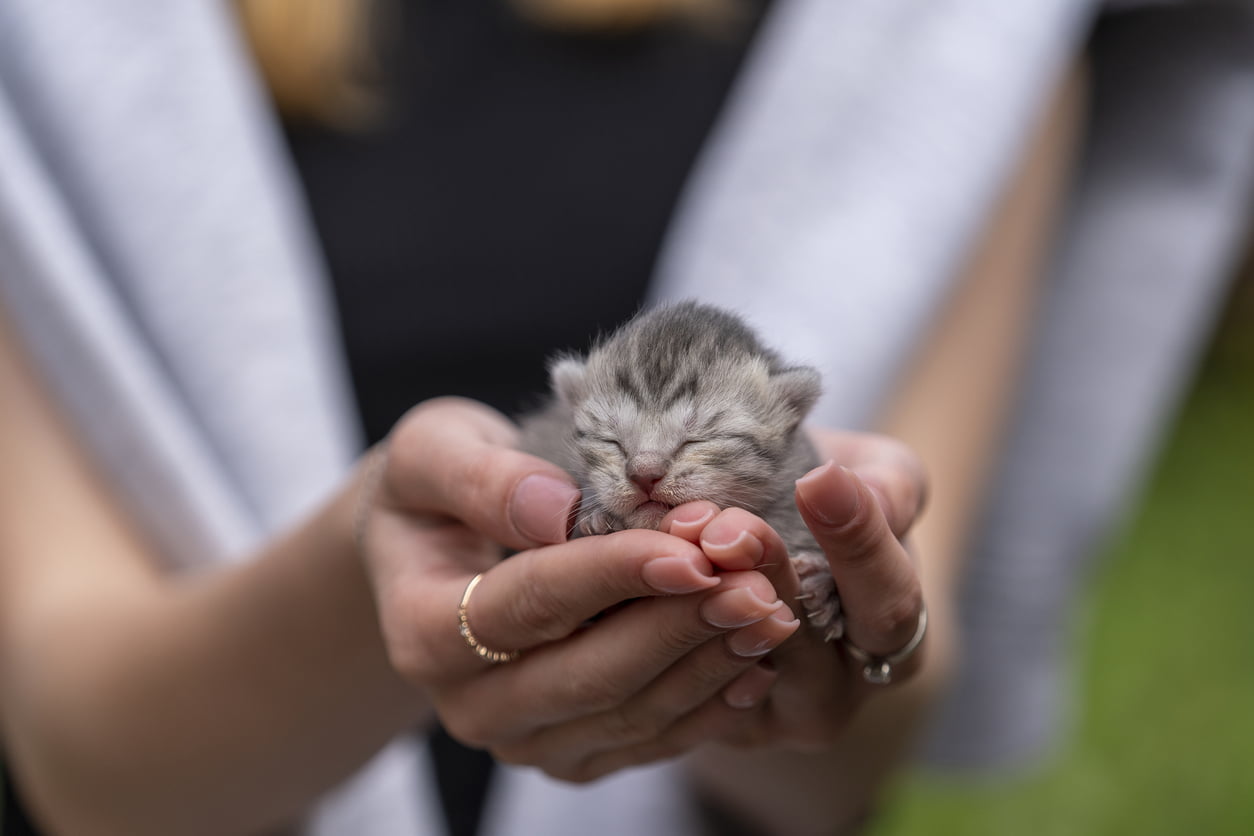
Caring for newborn kittens requires special attention and knowledge, especially if they are orphaned or experiencing health issues. By learning how to care for newborn kittens, including feeding kittens and monitoring their growth and development, you can ensure they are on the right track to a healthy, happy life.
Newborn kittens need to be kept warm and fed regularly. They should be monitored for signs of signs.
Caring for Orphaned Kittens
Orphaned kittens need extra care and attention to survive and thrive. Here are some steps to follow.
- Maintain a suitable temperature, as newborn kittens cannot regulate their body temperature. Create a warm and safe environment by covering the floor of their living area with a blanket and providing a warm bed.
- In the absence of their mother, kittens need to be fed a milk replacer specifically designed for them.
- Take orphaned kittens to a veterinarian for a thorough check-up and advice on their care.
As orphaned kittens grow, it is important to closely monitor their health and development, including keeping an eye out for feline leukemia. Look out for warning signs such as:
- Lack of appetite
- Lethargy
- Diarrhea
- Vomiting
- Difficulty breathing
If you notice any unusual or worrying behaviors, don’t hesitate to consult your veterinarian or contact an animal poison control center.
Monitoring Growth and Development
Keeping track of your kitten’s growth and development is vital to ensure they are healthy and thriving. Regular veterinary check-ups and deworming treatments can help eliminate most intestinal parasites and ensure their overall well-being. As your kitten grows, it is essential to introduce them to experiences such as nail trimming, using a scratching post, bathing, grooming, and traveling in a carrier to the veterinarian’s office.
Grooming is also an important aspect of your kitten’s development. Regularly brushing their fur helps remove:
- dust
- dead skin
- loose hair
- tangles
This prevents the formation of fur balls in their digestive system. Be gentle and patient during grooming sessions, and use appropriate tools to keep your kitten comfortable and well-groomed.
Feeding and Nutrition for Growing Kittens
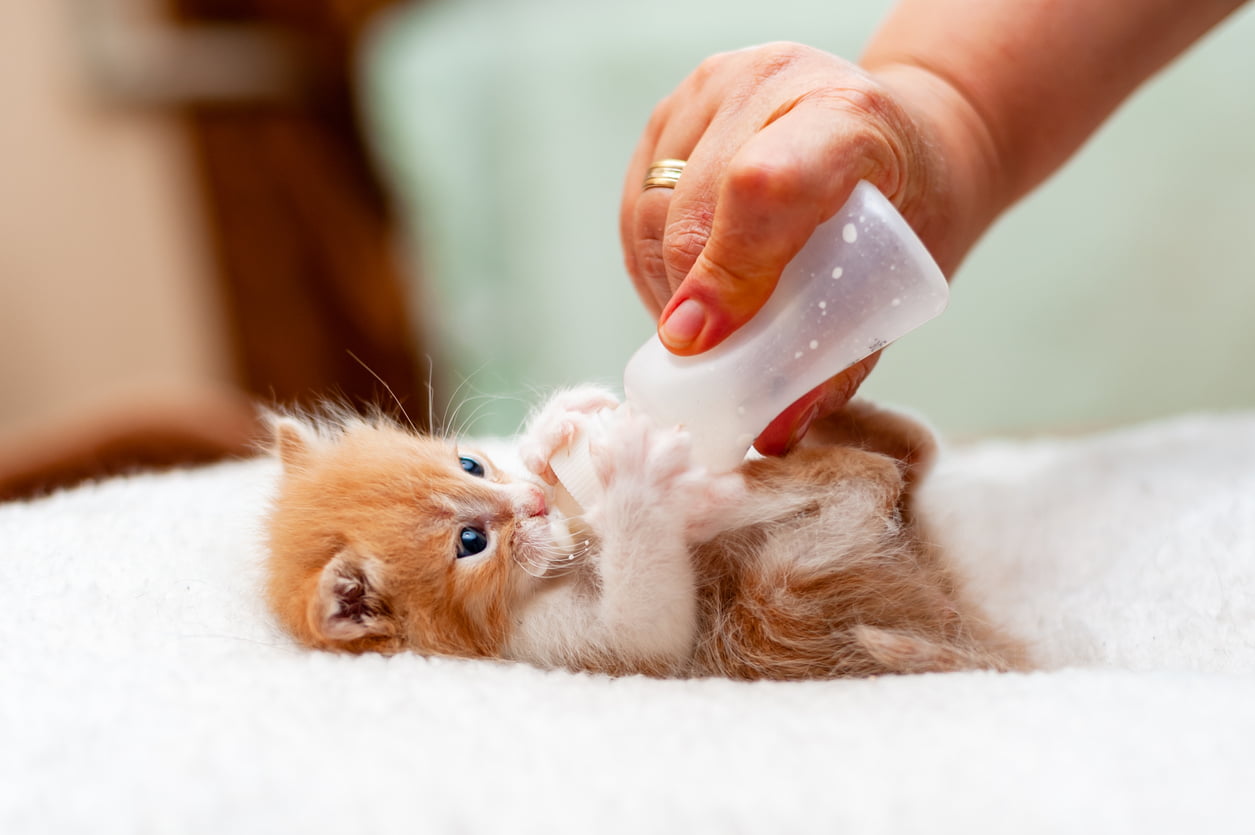
Proper nutrition is crucial for the healthy growth and development of your kitten. As they grow, they will transition from their mother’s milk to solid food and eventually to a balanced diet of high-quality kitten food.
Providing the right nutrition will not only support their physical growth but also contribute to their overall health and well-being.
Transitioning to Solid Food
Introducing solid food to your kitten’s diet is an important milestone in their growth. Kittens typically begin consuming solid food between 4 and 5 weeks of age. To facilitate this transition, you can start by offering them softened hard food or canned soft food, gradually increasing the amount of solid food, and decreasing the formula or gruel until they are eating only solid food.
Encourage your kitten to try solid food by applying a small amount to their lips or placing it in front of them on a shallow dish. Be patient and persistent, as it may take some time for your kitten to adjust to this new dietary change. Consult your veterinarian if you have any concerns about your kitten’s transition to solid food.
Choosing the Right Kitten Food
Selecting the right kitten food is essential for meeting their nutritional needs and promoting optimal growth. High-quality commercial kitten food, such as:
- Wellness CORE
- Royal Canin
- Purina ONE
- Instinct
It is specifically formulated for growing kittens and provides the nutrients they need.
Be sure to avoid kitten food containing:
- corn and wheat gluten
- meat and grain meals
- by-products
- food dyes
These ingredients may not provide the best nutrition for your growing feline friend.
Socialization and Playtime

Socialization and playtime are essential for your kitten’s overall development. Introduce your kitten to new experiences and other pets in a controlled and positive manner will help them grow into a well-adjusted and confident adult cat.
Engaging them in interactive playtime not only provides mental and physical stimulation but also strengthens the bond between you and your feline companion.
Introducing Your Kitten to Other Pets
When introducing more than one kitten to existing pets in the household, it is important to do so gradually and with supervision. Start by confining your new kitten to one room with all their essential supplies, such as a litter box, food, water, and a bed. Over the course of a few days, gradually introduce the scent of the other pets to each one by providing items carrying the other pet’s scent.
After the initial scent introduction, allow the pets to view each other through a mesh pen or baby gate. This controlled environment allows them to become familiar with each other’s presence while minimizing the risk of conflict. As your pets become more comfortable with each other, you can gradually increase their interaction under supervision until they are fully integrated.
Fun and Interactive Cat Toys
Keeping your kitten entertained and mentally stimulated is vital for their well-being. Offer a variety of fun and interactive toys, such as:
- fishing poles
- teasers
- mice toys
- scratchers
- tunnels
To keep them engaged and satisfied. Don’t forget to explore new objects like paper bags and cardboard boxes, which can provide hours of entertainment for your curious feline.
Chew toys, such as Petstages Dental Cat Chew Toy with Catnip and WoLover Silvervine Natural Catnip Sticks, can also help maintain your kitten’s dental health.
Health Care and Preventive Measures
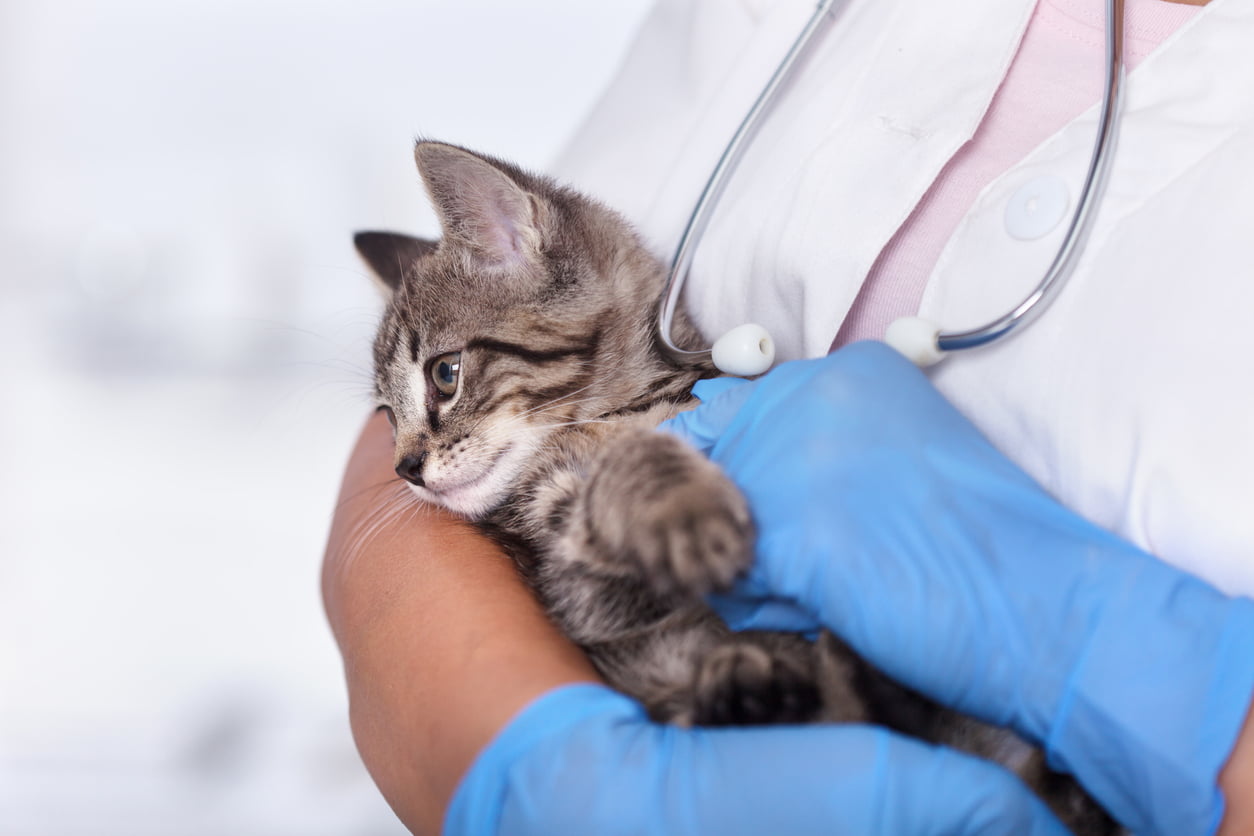
Ensuring your kitten receives proper health care and preventive measures is critical for their overall health and well-being. Regular veterinary check-ups, vaccinations, and spaying/neutering can help prevent serious diseases and detect potential health issues in their early stages when they are more manageable and cost-effective to treat.
It is important to keep up with your kitten’s health care needs to ensure they stay healthy.
Kitten Vaccination Schedule
Following a recommended vaccination schedule is crucial to protect your kitten from common diseases. Kitten vaccinations should be administered during three visits, spaced 3-4 weeks apart. These vaccinations include protection against:
It is important to consult with your veterinarian to create a tailored vaccination schedule for your kitten based on their specific needs and risk factors. Regular check-ups and adherence to the vaccination schedule will ensure your kitten remains healthy and protected from potentially life-threatening diseases.
Connect with a verified veterinarian in minutes. No waiting for appointments or office hours. No high fees. Your pet's health made convenient and worry-free.
Spaying and Neutering
Spaying and neutering your kitten offers numerous health and behavioral benefits, including:
- reducing the likelihood of certain cancers
- preventing roaming and marking
- decreasing aggression
- decreasing the number of cats and kittens in shelters without homes.
It is recommended to spay or neuter kittens between 5 to 6 months old, before they reach sexual maturity. Consult with your veterinarian to determine the best time for your kitten’s surgery and to discuss any concerns or questions you may have about the procedure.
Litter Box Training and Hygiene
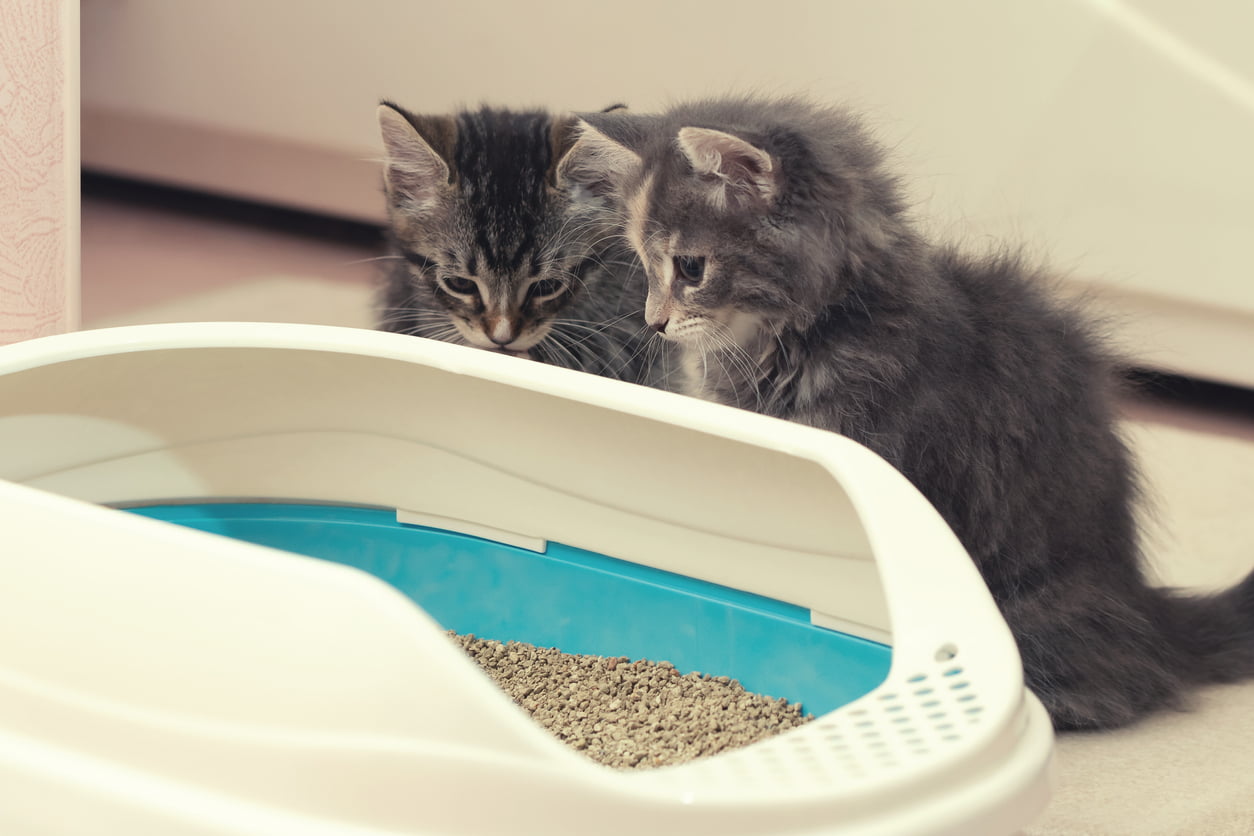
Proper litter box training and hygiene are essential aspects of kitten care. By teaching your kitten appropriate litter box habits and maintaining their cleanliness through grooming and bathing, you can ensure their overall health and well-being.
Good litter box habits should be taught from a young age. Make sure to provide your kitten.
Choosing the Right Litter Box
Selecting the right litter box is crucial for encouraging proper use and maintaining a clean environment for your kitten. Choose a low, easily accessible litter tray to accommodate your kitten’s smaller size and limited motor skills.
Consider your kitten’s preferences when selecting litter, as most cats prefer fine granules that are comfortable on their paws and help maintain a clean kitten’s stool.
Consult with your veterinarian if you have any concerns about your kitten’s litter box usage or if they are not adapting to the type of litter you have chosen.
Grooming and Bathing
Maintaining your kitten’s cleanliness is important for their overall health. Here are some tips for grooming your kitten:
- Regularly brush their fur to prevent matting and keep their coat in good condition.
- Trim their nails to prevent them from becoming too long and causing discomfort.
- Be patient and gentle during grooming sessions to ensure your kitten’s comfort.
- Use appropriate tools, such as a soft brush and cat-friendly nail clippers, for grooming.
By following these tips, you can help keep your kitten clean and healthy.
While most cats do not require bathing, there may be instances where a bath is necessary for your kitten’s well-being. If a bath is needed, follow these steps:
- Use lukewarm water.
- Use a mild, fragrance-free shampoo.
- Be gentle during the process.
- Rinse your kitten thoroughly to prevent soap from adhering to their skin and causing irritation.
Common Kitten Behavior Issues and Solutions
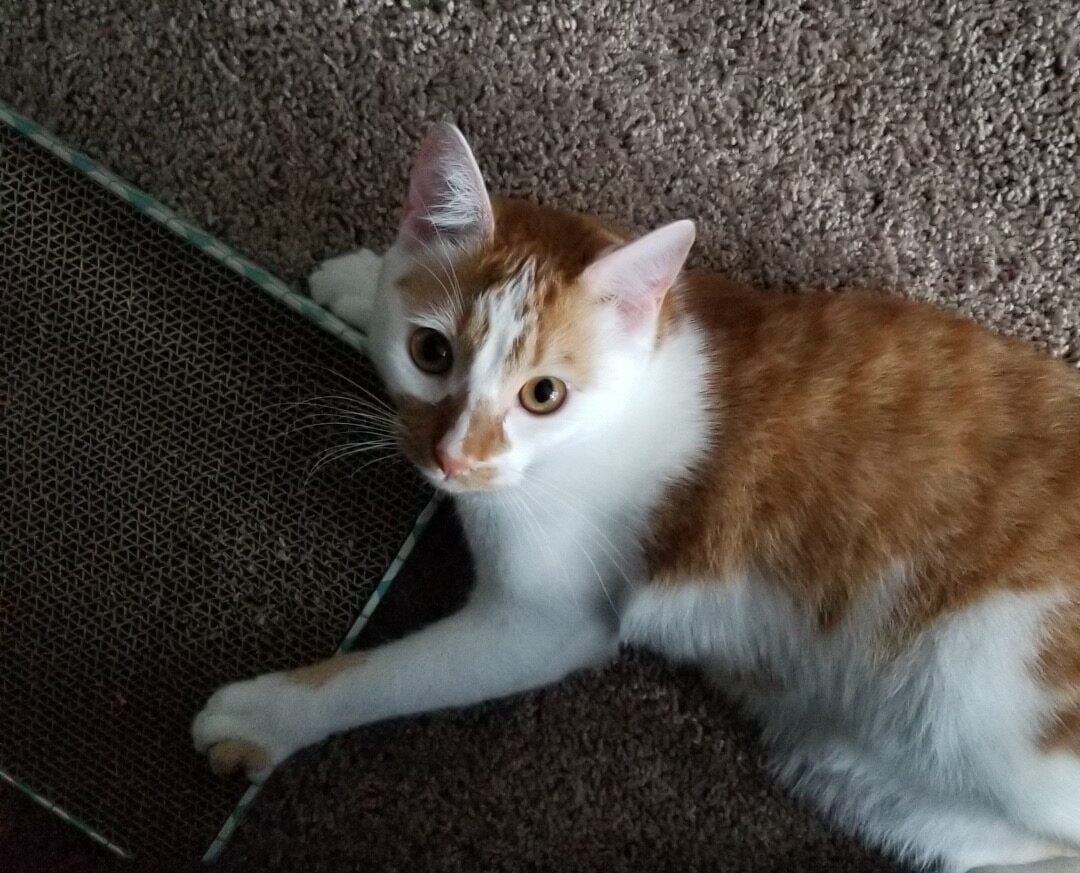
Addressing common kitten behavior issues, such as scratching furniture and biting, is important for maintaining a harmonious household and ensuring your kitten’s well-being. By providing effective solutions and proper training, you can help your kitten develop good behavior and avoid potential conflicts.
Kittens are naturally curious and playful, so it’s important to provide them with appropriate toys.
Scratching Furniture
Scratching is a natural behavior for kittens, but it can become a problem when they target furniture and other household items. To deter your kitten from damaging furniture, provide them with a variety of scratching posts and mats to redirect their scratching behavior. Covering furniture with a protective material can also help prevent damage while your kitten learns appropriate scratching habits.
It is important to be patient and consistent in your training efforts. Reward your kitten when they use the scratching post and gently redirect them when they scratch inappropriately. With time and positive reinforcement, your kitten will learn the proper place to scratch.
Biting and Aggression
Biting and aggression in kittens can be concerning and may lead to injury if not addressed properly. To prevent these unpleasant habits, utilize reward-based training to encourage desirable behaviors and discourage biting and aggression. Providing an alternate target for your kitten’s biting and play aggression can also help redirect their energy in a more appropriate manner.
If your kitten exhibits biting or aggression during playtime, calmly end the interaction and give them time to calm down. Consistent reinforcement of this approach will help your kitten understand that biting and aggression are not acceptable behaviors, leading to a happier and more harmonious relationship between you and your feline friend.
Summary
Caring for a kitten is a rewarding and fulfilling experience that requires dedication, knowledge, and patience. By following the guidelines provided in this comprehensive guide, you can ensure your kitten’s well-being and develop a strong bond with your new feline companion. From preparing your home and caring for newborn kittens to addressing common behavior issues and maintaining proper health care, you now have the tools you need to provide your kitten with a happy, healthy, and enriching life.
Frequently Asked Questions
Where do you keep a new kitten at night?
The best place for a new kitten to sleep at night is in a warm and secure spot near your bed. Choose a spot sheltered from draughts and up off the ground if possible. Provide blankets and a padded cat bed for extra warmth and security.
How do you take care of a kitten for beginners?
Socialize your kitten by introducing them to new people and animals, toys introduction, frequent petting and cuddling, and reward good behavior with treats. Establish a routine for nutrition, bedding, litter trays, play time, grooming, reward-based training, scratching poles, and health care.
Gradually introduce them to their cat carrier, grooming, being picked up, handling, and having their ears, eyes, and other body parts checked.
Is it OK to leave kittens alone at night?
Kittens should not be left alone overnight, especially those younger than 2 months old.
When it comes to kittens aged 2-6 months, they shouldn’t be left alone for more than eight hours.
What not to do with a new kitten?
Do not force your kitten to socialize or cuddle, or yell, threaten, or physically punish them. Avoid putting the kitten in a large room and do not let it go outside unless supervised.
Provide appropriate toys, scratching posts, and litter boxes for the kitten to prevent damage to furniture.
What is the recommended vaccination schedule for kittens?
Kittens should receive booster vaccinations during three visits spaced 3-4 weeks apart, to protect against feline distemper, herpes, calicivirus, and rabies.
These vaccinations are important for kittens to build up immunity to these diseases and to protect them from serious health complications.
It is recommended that kittens receive their first booster vaccination at 8-10 weeks of age and then receive two more booster vaccinations spaced 3 weeks apart.

